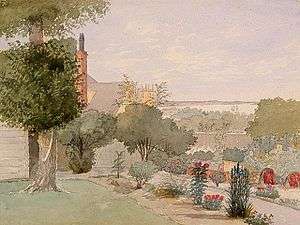Royal Artillery Park (Halifax)
Royal Artillery (RA) Park is a military installation in Halifax, Nova Scotia, Canada that forms part of Canadian Forces Base Halifax. It is home to the headquarters of 36 Canadian Brigade Group and the official residence of the Commander of the 5th Canadian Division. On the grounds of RA Park, is the oldest military Officers' mess in Canada (1816) and the Cambridge Military Library which houses one of the oldest library collections in the country (1810)[1]. Royal Artillery Park was initially funded from the conquest of present-day Maine, which was renamed the colony of New Ireland.

History
The site of RA Park was acquired in 1799 from John and Richard Cleary for £150, in the name of Prince Edward, to provide soldiers quarters, stores, officers' accommodations and a headquarters for the Royal Artillery personnel stationed in Halifax. Its acquisition resulted in the move of the Royal Artillery personnel and equipment from congested quarters on Argyle Street, opposite Grand Parade, Where the World Trade and Convention Centre is now located.[2]
Around 1800, the Royal Engineer Establishment consisting of RE Square and the South Barracks were established on the east side of RA Park to provide accommodations for the Royal Engineers. These lands were thus incorporated into the Halifax fortifications, which became collectively known as Imperial Fortress Halifax, with similar status as the Imperial Fortress of Bermuda, Malta and Gibraltar.
In the far corner of the Royal Artillery Park, a diminutive red brick building, is the Cambridge Military Library. This building was the social and literary centre of military Halifax. The Library opened in 1817 at Grafton Street, as an alternative to the more notorious choices of city entertainment. It moved to its present location in Royal Artillery Park in 1886 and was renamed Cambridge Military Library in 1902. The library was funded in part from Customs receipts gathered during the War of 1812 at the Battle of Hampden.[2]
Gallery
- An Ordnance QF 18-pounder and other guns
 Cambridge Military Library, Royal Artillery Park
Cambridge Military Library, Royal Artillery Park- An Ordnance BL 12-pounder 6 cwt